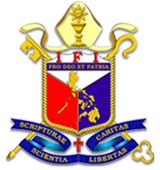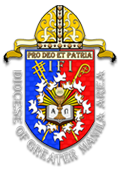Fishers of People
Reflection on the Third Sunday After Epiphany
 INTRODUCTION
INTRODUCTION
One of the most important seasons of the Christian year is the Epiphany, the Manifestations of God’s salvific plan through Christ. On this third Sunday after the Feast of Epiphany, the readings (First Reading and the Gospel of Mark) speak of God’s callings to two parties: (1) To Jonah, who at the onset refused the call but later obeyed; and (2) To the first four of the 12 disciples of Jesus, who obeyed God’s call without hesitation. Jonah escaped from God by seeking the sea; the four disciples, however, escaped from the sea by seeking God. While Jonah’s mission was addressed to the Ninevites, non-Israelites (first during his time); the four disciples were sent to witness to both Israel and other nations during the time of Jesus and the aftermath of His death and resurrection.
UNDERSTANDING JONAH
Jonah, son of Amittai, was an Israeli prophet during the 8th century (BC) who lived in Gath-heper (town one hour away from Nazareth). It was believed that he was the son of the widow of Sarepta whom Elijah brought to life and a follower or disciple of Elisha whom he succeeded as prophet. He was a famous statesman who lived during the time of Jeroboam II; and was later commanded by God to prophesy to Nineveh to repent or otherwise be destroyed by God.
Nineveh was the powerful capital of Assyria during the reign of Sennacherib; but fell to the Babylonians later. It was situated at the east bank of the Tigres River, 400 miles from the Mediterranean. Nineveh, a heathen city, had a population then of 120,000 people and had a stronghold of 30 miles in length and 10 miles in width, and walls of 100 feet high. There were great palaces and beautiful gardens inside, with 70 halls decorated magnificently. Great in wealth, power, and intellectual attainment, it was a city also known for its wickedness.
Jonah’s love for Israel moved him to flee from God’s command to prophesy to Nineveh. He believed that if Nineveh repented from its wickedness, God would favor it and Israel would fall under Assyrian rule. His self-pride and scorn for Nineveh (and the world) hindered him from following God’s command. He took a ship bound for Tarshish (Tartessus in Spain), but a great storm sent by God caused fear on the shipmates who realized that this was brought upon them by the intruder Jonah. He was tossed overboard and was swallowed by a big fish (sperm whale), which later vomited him after repenting of his sins against God. Upon Jonah’s acceptance of God’s second message to Nineveh, the whole city repented, from the greatest to the least; and God spared them. Furious, Jonah was displeased with God, who taught him a lesson with the use of a castor-oil plant. As Jonah was sorry to lose the plant (eaten by worms) which protected him, so God explained to him His compassion if He were to lose the great city of Nineveh.
UNDERSTANDING THE FOUR DISCIPLES
Jesus began His ministry in Galilee in Northern Israel, and He chose familiar partners in mission, relatives and friends known to Him. To start off, there was mutual trust and He started in familiar surroundings. Though He himself was a carpenter by training and occupation, He called his first four disciples, fishermen from the Sea (Lake) of Galilee – brothers Peter (Simon) and Andrew; and brothers James and John. Despite losing their fishing jobs and without ministerial experience, the four men left their families and loved ones, and without hesitation followed Jesus to pursue a ministry totally unknown to them.
The brothers Peter and Andrew were from Bethsaida (Hebrew meaning, “house of fishermen”), town along the northeast of the Sea (Lake) of Galilee near the Jordan River. Later they lived in Capernaum, center of Jesus’ ministry in Northern Israel. Simon, leader of the disciples, was the son of Jonas, and worked together as fishermen with James and John. Later called Peter “the Rock” by Jesus, he was fiery, impetuous, and vacillating. He was part of the “inner circle” with James and John (core favorites) of Jesus, as they were witnesses to three important events in the ministry of Jesus: the raising of Jairus’ daughter from death to life, the transfiguration of Jesus, and the agonizing time of Jesus in prayer in the Garden of Gethsemane before His passion and crucifixion. Despite all his faults, including his denials of Jesus during the latter’s most difficult hours, Peter was declared “the Rock” by Jesus upon whom the Church was to be built.
Andrew, Simon’s brother, was a disciple or follower of John the Baptist. Nothing much was known about Andrew, except that he was also a fisherman and a practical man. His most important role was that he introduced Simon to Jesus.
James and John, sons of Zebedee, husband to Salome who ministered to Jesus. (She was a witness to Jesus’ crucifixion and later at the empty tomb.) The two brothers were called by Jesus as “Boanerges,” or “sons of thunder” due to their hot-temper, pride and ambition. They sought for higher positions in God’s Kingdom. But little did they know at the start that they would suffer like Jesus. James was the first to be martyred among the faithful disciples of Jesus.
Considered the “Beloved Disciple” of Jesus, John was a cousin of Jesus on his mother’s side and considered a common man and uneducated like Peter. Nevertheless, his privileged position of fully knowing Jesus revealed to him many facets of Jesus’ spiritual-and-divine side. The only faithful disciple who witnessed Jesus’ agony on the cross, he was committed to care for Jesus’ mother, the Blessed Mary. Known as John the Evangelist (to distinguish from John the Baptist), he wrote five books: Gospel According to John, three letters (epistles), and the Book of Revelation which foretold the scenes of the end of times. Unlike the other disciples who died a martyrs’ death, John died of natural cause in his old age, according to biblical scholars.
UNDERSTANDING THOSE CALLED BY GOD
God called people to fulfill His mission on earth according to His purpose or plan. Sometimes the reasons are evidently known at the outset but sometimes not. Those called come from varied backgrounds and situations in life – a stateman-turned prophet like Jonah, familiar relatives or friends like the uneducated fishermen, or even like myself from the comforts of two-decade residency abroad. The responses to the calls may be as diversified as their backgrounds from where they come from and/or the personal motives behind them. Normally, the fears accompany and determine the responses: (1) Non-obedience punishable by God, like Jonah’s experience; (2) Departure from life’s comforts (including leaving families/friends) and accustomed livelihood, like the fishermen’s; (3) Unknown missions and perceived difficulties in accomplishing them; and (4) Anticipated failures and hostile receptions from those with either prejudice or lack of understanding on someone’s destiny.
In the readings for this Sunday, fear is aptly symbolized by the unknown water (lake, sea, ocean): whether to swim or tread (or leave) the unknown depths of the water; to sink or drown in the unfathomable water; to reach across the vastness of the ocean water; or to be carried away by the strong winds with the water to some unknown missionary destinations. Personally, these were the fears which I myself encountered in contemplating to follow my divine calling coming at an advanced stage in my life: the trepidations of traversing the vast Pacific Ocean to transcend beyond what is incomprehensible and to leave behind my beloved twin sons, comfortable life, stable job, familiar surroundings in order to envision a totally unknown horizon though somehow related to my familial roots. And how many truly divinely- called encounter such apprehensions?
But God, in His infinite wisdom and great compassion, converts these fears into assurances and strong positive spiritual forces to utilize the talents inherently provided to them. Those who used imagined or actual impediments when called to ministry – like Jeremiah’s youth, Isaiah’s unclean lips, Ezekiel’s stubborn nature, Jonah’s grudge against Ninevites, etc. – were unsuccessful in persuading God not to pursue His will on His chosen missionary agents. All inadequacies were set aside, properly empowering them to use their innate strengths from their backgrounds (e.g., fishermen’s capability, endurance, courage, firmness, patience, teamwork) to fully and wisely utilize their advantages. The mutual trust between the caller and the called was an added factor which enhanced the successful pursuit of the missions despite the “briers and thistles” of ministry. Following the Lord is not a “bed of roses” but a “garden of thorns and roses” watered by the love of God with rewards in a foreseeable Kingdom.
THE CHALLENGE
Those called to ministry, clergy or laity, maybe apprehensive of God’s divine purpose, and more likely fearful of the unknown part of the spiritual journey. But these are all experienced by those truly called especially as in these changing times when we are unprepared to face the new challenges ahead of us, e.g., coronavirus, natural calamities, social and political unrests, etc. But trusting in our profound faith in God’s unbounded love and grace, the fears of the unknown can be overcome, just as the imperfect disciples of Jesus trusted without hesitation and followed His guidance and teachings to pursue the paths laid out for them by the Lord. So too in our own lack of comprehension of God’s master plan for humanity, we can strive to become good and faithful “fishers of people” spreading God’s baptismal covenant and divine message of salvation, with the heartfelt assurance that “He will be with us to the ends of the earth” (Matthew 28:19-20).


